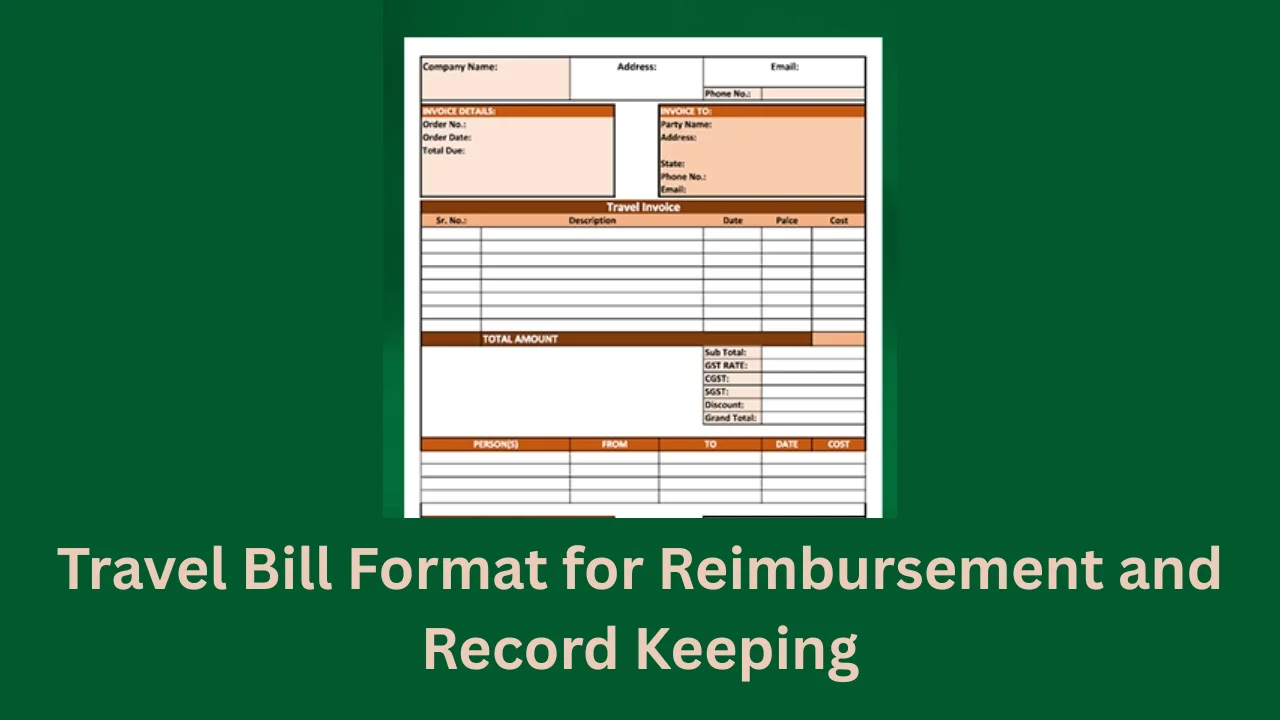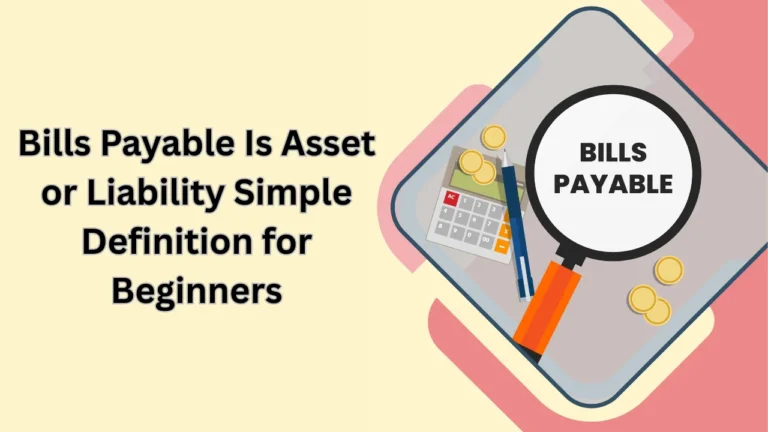Managing travel expenses becomes easier when you know how to prepare and use a travel bill format. For both individuals and businesses, documenting travel costs is essential for transparency and reimbursement. Many organizations also link their reimbursement system with financial services like zila sahkari bank balance check number, making accurate billing even more important.
In this article, we will explain what a bill format is, why it matters, what details it must include, and how you can create one. We will also share examples, tables, and tips so you can confidently prepare a professional travel expense bill.
What Is a Travel Bill Format?
A travel bill format is a structured template used to record expenses during official or personal travel. It works as proof of payment and helps organizations reimburse employees or claim travel deductions. The format usually contains information such as traveler details, journey dates, destinations, transport, accommodation, meals, and total expenses.
It is not just a document for claiming money; it is also a record that maintains financial accountability. Using a proper bill format ensures that both the traveler and the organization have clear visibility of expenses.
Why Is a Travel Bill Format Important?
Businesses use travel bills to monitor budgets and prevent fraud. Employees rely on them for quick reimbursements. A bill format standardizes the process, reducing confusion and saving time.
For companies, these bills also act as legal records. If audited, travel bills serve as evidence of genuine expenses. For employees, the format simplifies submitting claims without missing essential details.
Essential Components of a Travel Bill Format
To be effective, a bill format should include clear sections. Here are the main components explained:
| Section | Details Required |
|---|---|
| Traveler Information | Name, designation, department, contact details |
| Travel Purpose | Reason for travel, project or client details |
| Journey Dates | Departure date, return date, and travel duration |
| Destinations | Cities or countries visited |
| Transport Details | Flights, trains, buses, taxis, or personal car |
| Accommodation | Hotel name, check-in and check-out dates |
| Meals and Other Costs | Food, visa, insurance, and miscellaneous expenses |
| Total Amount | Subtotal of expenses, taxes, and final claim |
| Approvals | Employee signature, manager approval, finance verification |
When all these fields are covered, the travel bill format becomes complete and professional.
Sample Travel Bill Format
Here is a simple table showing how a travel bill format can be presented for clarity:
| Date | Description | Expense Type | Amount (INR) |
|---|---|---|---|
| 02-08-2025 | Flight Ticket | Transport | 7,500 |
| 03-08-2025 | Hotel Stay | Accommodation | 4,200 |
| 03-08-2025 | Lunch with Client | Meals | 950 |
| 04-08-2025 | Taxi | Local Travel | 500 |
| Total | 13,150 |
This simple table makes the travel bill easy to review and approve.
Types of Travel Bill Formats
A travel bill format can vary depending on its use. Some common types include:
Employee Reimbursement Format: Used by staff for official travel expenses.
Corporate Client Format: Issued by travel agencies to businesses for bulk bookings.
Personal Travel Expense Format: For individuals tracking personal trips.
Government Travel Bill Format: For officials and government employees, often with strict guidelines.
Each type follows the same principle: clear, detailed, and verifiable information.
How to Prepare a Travel Bill Format
Preparing a travel bill format is simple when you follow a step-by-step process. Start by gathering receipts for tickets, hotels, and meals. Next, enter these expenses into a structured table. Then, calculate totals, apply taxes if applicable, and get signatures for approval.
For corporate use, many companies provide pre-designed templates in Word or Excel. For personal use, you can create your own with basic details. Digital tools also make it easy to link travel bills with banking services such as bank of maharashtra balance check number, which ensures that reimbursement happens smoothly.
Travel Bill Format vs. Invoice
While similar, a travel bill format and an invoice are not the same. An invoice is usually sent by a vendor or service provider to request payment. A travel bill format, on the other hand, is created by the traveler or employee to request reimbursement.
| Feature | Travel Bill Format | Invoice |
|---|---|---|
| Purpose | Claim reimbursement | Request payment |
| Creator | Traveler / Employee | Service Provider |
| Content | Travel details, expenses | Service charges, customer details |
| Usage | Internal reimbursement | External payment collection |
Understanding this difference helps organizations manage both processes correctly.
Common Mistakes in Travel Bill Formats
Many people make small mistakes that delay reimbursement. Some common errors include missing receipts, unclear expense descriptions, and wrong dates. A poorly structured travel bill format can also create confusion for finance teams.
To avoid these issues, always double-check the dates, ensure totals are correct, and attach all receipts. Using digital templates reduces errors significantly.
Travel Bill Format for Corporate vs. Personal Use
For corporate use, the travel bill format is strict, often requiring approvals from managers and finance departments. Companies also require itemized details for audits. Personal travel bills, however, are more flexible. They mainly serve as records for personal budgeting or tax deductions.
Employees traveling for business must always follow company policy. This ensures faster approval and avoids rejection.
Digital Tools for Travel Bill Format
Modern companies use expense management software to automate the travel bill process. These tools allow employees to upload receipts, fill digital forms, and track approval status.
Popular tools provide mobile apps where travelers can scan receipts instantly. This eliminates paper clutter and improves accuracy. Companies adopting these solutions save time and reduce fraud.
Benefits of Using a Proper Travel Bill Format
The advantages of using a travel bill format are clear. It saves time, improves accuracy, and ensures quick reimbursements. It also helps organizations keep proper financial records for audits.
For employees, it reduces stress and builds trust with employers. For businesses, it enhances transparency and prevents overspending. A standardized travel bill format is a win-win for both sides.
Travel Bill Format Template Download
Many online resources provide free and customizable travel bill formats in Word, Excel, or PDF. Choosing a template depends on your needs. An Excel format works best for calculations, while a PDF format ensures no changes are made once finalized.
Below is an example layout that organizations often use:
| Field | Example Entry |
|---|---|
| Employee Name | Ramesh Kumar |
| Department | Sales |
| Travel Purpose | Client Meeting |
| Travel Dates | 05-09-2025 to 07-09-2025 |
| Destination | Mumbai |
| Expenses | Flight – 6,200, Hotel – 3,500, Food – 1,200 |
| Total Claim | 10,900 |
| Approved By | Manager Signature |
Conclusion
A travel bill format is more than just a piece of paper. It is a professional record that ensures fair reimbursement and accurate financial reporting. From employees to businesses, everyone benefits when expenses are documented properly.
By following the right format, avoiding mistakes, and using digital tools, you can make the process smooth and efficient. Whether it is for corporate or personal use, having a clear travel bill format will always make your journey stress-free.




